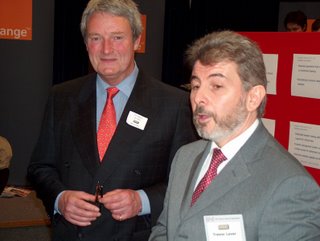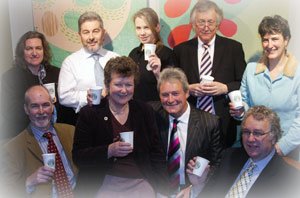Blogging For Coffee - Part 2: From Grey Cells to The Coffee Consultants

Blogging For Coffee
I had introduced a possibility to the group, an aesthetic medicine practice linked to a clinic specialising in treatments for painful or unsightly veins. Together, we came up with a concept for a seminar which was predicated on the very high failure-rate of practitioners entering the field, usually from the NHS.
We saw the seminar as a template for a future, parallel enterprise to sit alongside corporate consultancy. It happened, and as an exercise in showcasing our complementary skills it was a success – but not enough people attended to convince us we had the right formula.
For about five minutes, we howled at the moon, cursed the ingratitude and stupidity of those who had turned their backs on us and told each other that the breakthrough was only just around the corner.
After that, the professional default kicked in. Viewed dispassionately, we had a proposition for business but it was incomplete. We could teach or help people manage, market, advertise and sell but what about the key discipline of financial control?
I must confess to having avoided accountants for most of my life because they speak a language more complex than Mandarin and seem intent on putting me in the frame for the National Debt. But – and it is a big but – they are the only show in town. Accounts are mandatory, not optional, and there are lessons in the figures only a fool intent on business suicide would deny.
Our problem was that most accounting is historic. It presents a detailed picture of the recent past, and we were seeking for a partner who could make the process of financial review constructive – someone who, like a Roman soothsayer, would fish around in the entrails of a balance-sheet and deduce necessary or valuable changes of direction.
We had a false start with a large regional player. The tax partner we met was at pains to stress that his drive and energy had transformed his firm from a sleeping pygmy to a giant which was beginning to rattle the cages of the nationals. We took him for a man for the bigger picture, but when we presented to him he chose to see our proposition as a request to him to open up his client-list to approaches from us. He could not see that what we were proposing was an equal and mutually advantageous partnership that could create an innovative, fully integrated business development consultancy.
Two other failures followed in short order before we found the partner we should have approached in the first place because he was right under our noses.
Martin Bowe was also a stalwart of BNI, an Oxford-educated tax accountant with an entrepreneurial streak, who had broadened his Probusiness practice to include a management accountant, an HR professional and a book-keeper. Although the synergies were less obvious, the chemistry was there from the start of discussions. Tricia, the HR lady, had a background which located her close on the business GPS to Martin Lambden, but the other Martin and Fiona, his management counterpart, could see reciprocity and added value in a marketing proposition which Nick or Trevor would articulate while they identified the funds and justified the spend.
Without an accountancy partner, in a region without a consultancy culture, Grey Cells were too easily dismissed as an expensive option or overhead; with Probusiness, we were demonstrating exactly the financial responsibility consultants are condemned for avoiding.
New game, new name. We become The Coffee Consultants. Why? The answer to this and other questions will be found in Part 3 of "Blogging For Coffee"



